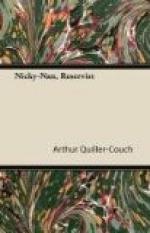“Which is the backbone of Old England,” interposed Farmer Pearce, “an’ always has been.”
“There’s two ends to most backbones,” put in young Obed, who had been tracing patterns with his fingers on the surface of the mahogany table. “And I don’t pretend to have the cleverer one. But I don’t want the other to be kicked into doin’ summat; which is what’ll happen to us farmin’ chaps if we don’t start enlistin’.”
“The aggericultural community,” persisted his father, who had picked up that resonant term at meetings of the Farmers’ Union, “is, an’ always has been, the backbone of England.”
“Then ’tis time we showed it, in the Yeomanry.”
“I wish you’d hold your tongue on that word; when you know your mother never hears it spoke but she wakes me up at night with the palpitations. . . . We be showin’ it, I tell ‘ee. We be doin’ something for our country in this here crisis. Why, didn’ Squire Tresawna ride over but yesterday an’ commandeer Tory an’ Pleasant?— that’s my two best waggon-hosses,” the farmer explained to his brother-in-law. “An’ didn’ he say as most likely he’d be over again, inside a fortni’t, after light draught hosses for the Artillery? I don’t murmur, for my part. We must all be prepared to make sacrifices in these times. But all I say is, you can’t pick up draught hosses—light or heavy—off a greengrocer, nor yet off a bird-fancier; an’ the man who says you can, I’ll tell him to his face he’s no better than a liar,” concluded Farmer Pearce, suddenly growing crimson in the face, and smiting the table with unnecessary heat.
“If the hosses be goin’, why should the men linger?” young Obed urged. “An’ I don’t see what you sacrificed either, over Tory an’ Pleasant; for you told me yourself the Squire gave a very fair price for ’em.”
“Well, an’ I should hope so! You don’t reckon as I was goin’ to make Government a present of ’em, do ’ee?—a man rated up to the ears, as I be!” Here he glanced nervously at his brother-in-law, who (as a town-dweller) held the monstrous belief that farmers enjoyed their share, and even a little more, of relief from rating, and had more than once shown argumentative fight on this subject in the piping times of peace. But Mr Pamphlett tactfully ignored the challenge.
“Listen to me, Obed,” he put in. “By what I hear from London, as well as what I read in the papers, the most serious question before this country just now is to maintain—or, as I might put it, to keep up—an adequate supply of foodstuffs. To which end,” pursued Mr Pamphlett, in the weighty periods of the “leading article” from which he had gathered this information, “it appears to us—I mean, to me— that our agricultural friends would be well advised, at this juncture, in considering the advisability, as well as the feasibility, of restoring a quantity of their pasture-land to an arable condition, and cultivating it as such. The Board of Agriculture, it is understood, will shortly issue a circular—er—on these lines. Now you cannot effect the change thus indicated without labour—”




